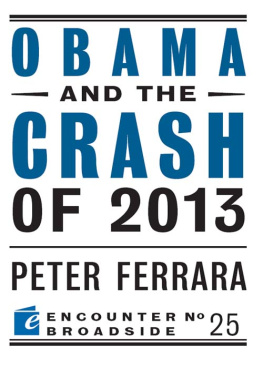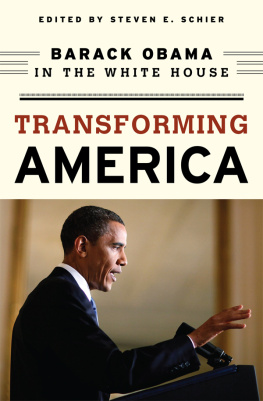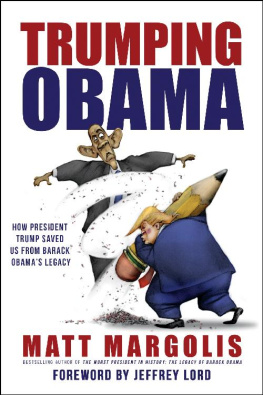

ENCOUNTER BROADSIDES: a new series of critical pamphlets from Encounter Books. Uniting an 18th-century sense of political urgency and rhetorical wit (think The Federalist Papers, Common Sense) with 21st-century technology and channels of distribution, Encounter Broadsides offer indispensable ammunition for intelligent debate on the critical issues of our time. Written with passion by some of our most authoritative authors, Encounter Broadsides make the case for liberty and the institutions of democratic capitalism at a time when they are under siege from the resurgence of collectivist sentiment. Read them in a sitting and come away knowing the best we can hope for and the worst we must fear.

M ost people do not know that already enacted in current law for 2013 are increases in the top rates of virtually every major federal tax. That is because the tax increases of ObamaCare become effective that year, and the Bush tax cuts expire, which Obama has refused to renew for the nations small businesses, job creators, and investors.
As a result, if the Bush tax cuts expire just for singles making over $200,000 per year and for couples making over $250,000, in 2013 the top two income tax rates will jump nearly 20 percent, the capital-gains tax rate will soar by nearly 60 percent, the tax on corporate dividends will nearly triple, and the Medicare payroll tax will leap by 62 percent for those disfavored taxpayers.
This is on top of the U.S. corporate income tax rate, which is virtually the highest in the industrialized world. The federal rate is 35 percent, with state corporate rates taking it close to 40 percent on average. But even Communist China has a 25 percent rate. The average rate in the heavily socialist European Union is less than that. Formerly socialist Canada has a 16.5 percent rate, which will go down to 15 percent in 2012.
U.S. corporate tax rates leave American companies uncompetitive in the global economy. Yet under President Obama, there is no relief in sight. Instead, he continually proposes still further tax increases on American business.
Higher tax rates mean producers can only keep a smaller percentage of what they produce. So tax-rate increases reduce the incentive for productive activities such as saving, investment, starting businesses, expanding businesses, job creation, entrepreneurship, and work resulting in less of each. And that is what Barack Obamas tax tsunami for 2013 is going to do, which will swamp the weak economy.
Most small-business profits are reported from households earning more than $200,000/$250,000 per year, and those small businesses produce more than half the new jobs. So Obamas 2013 tax tsunami effectively targets small businesses and the nations job creators. That will hurt working people the most because they will lose the jobs and the wage income they need to maintain their basic standard of living.

U.S. corporate tax rates leave American companies uncompetitive in the global economy.

It is incentives to produce that drive the economy, which was the insight of Reaganomics. Expand the incentives, and the economy will recover and boom. Weaken those incentives, and the economy will fall into further decline.
Obamanomics is based instead on the old-fashioned Keynesian economics of the 1930s to the 1970s, which holds that government spending and deficits are the foundation for economic recovery and prosperity. If that were true, then America would be enjoying its strongest economy ever right now. Government spending and deficits do not lead to economic growth and prosperity. Just the opposite.
O BAMAS R EGULATORY B LIZZARD
Besides imposing all these tax-rate increases and uncompetitive rates on American businesses large and small, the blizzard of new regulatory costs and barriers imposed by the Obama administration will be building to a crescendo by 2013 as well. Academic studies estimate the total costs of regulation in the economy to be rapidly rising toward $2 trillion per year, or $8,000 per employee. That is close to 10 times the corporate income tax burden and double the individual income tax. When the resulting effects on the economy are considered, the total losses due to regulatory burdens may total $3 trillion, or one-fifth of our entire economy.
But by 2013, these regulatory costs will have exploded in unprecedented fashion because of the regulatory blizzard coming from the Obama administration. Already, Obama and his minions have loaded up another 4,225 new federal regulations in the pipeline toward implementation. But the heavy regulatory artillery is just being wheeled into place.
The Environmental Protection Agency (EPA) is effectively imposing cap and trade by administrative regulation under the Clean Air Act without congressional approval. They have already issued an endangerment finding that greenhouse gases threaten the public through global warming. But the Clean Air Act leaves little room for flexibility. That endangerment finding sets us on the road to ultimately banning any major carbon emissions from the burning of oil, natural gas, and coal. That would effectively repeal the Industrial Revolution: an environmental-extremist dream but a nightmare for working people and the economy. It would mean the end of the American Dream and of Americas heritage of world-leading economic prosperity.
Though modern nuclear power plants are safe, the nuclear accident in Japan precludes increased reliance on nuclear power for the foreseeable future. And powering a modern, 21st century industrial economy with alternative energy from wind, solar, and biofuel is a fantasy rather than a dream. The energy content in these alternatives is highly diffuse, which means they are inherently costly and inefficient. That should not be surprising, because they are basically the power sources of the preindustrial Roman Empire 2,000 years ago.
They each require vast land areas for windmills, solar panels, or crops. They also require traditional power sources as a backup for when the wind doesnt blow or the sun doesnt shine, which would further add to the overwhelming costs. But if the endangerment finding means the phaseout of coal, natural gas, and oil, then there are not going to be any backup power sources.
The EPA is starting implementation of this new, unprecedented regulatory burden by first targeting carbon emissions from major industrial plants and utilities, so the general public wont see the burden before the 2012 election. But this is going to start raising energy costs, making American manufacturing more uncompetitive in the global economy. In 2013 and thereafter, unless we change course, the regulation will be expanded to affect virtually every business in the economy, large and small, every commercial facility, every significant building and office, every hospital and medical facility, every restaurant, even smaller fast-food operations. That will mean at a minimum trillions in new costs to the economy. A modern industrial economy cannot function over the long run under these requirements.
Next page










